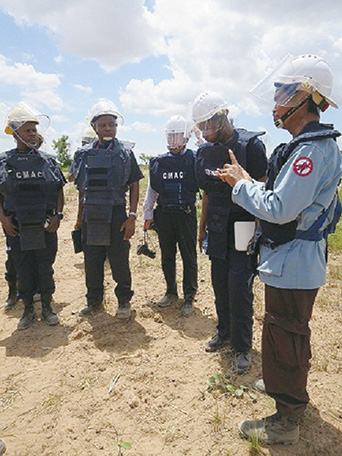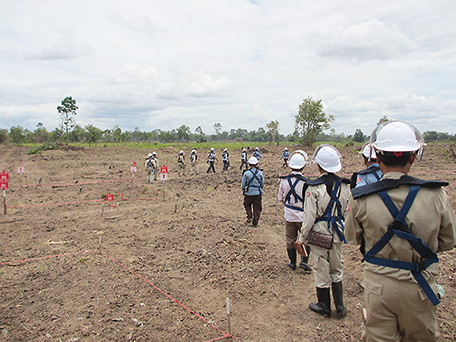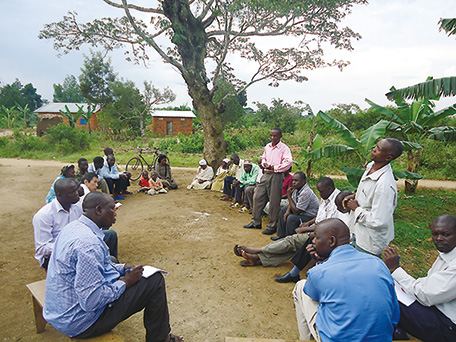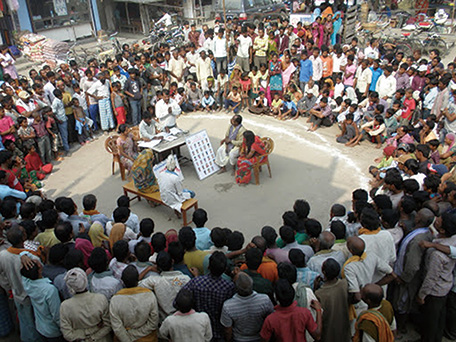(6) Unexploded Ordnance, Antipersonnel Landmines, and Small Arms and Light Weapons, etc.
In post-conflict regions, unexploded ordnance (UXO) including cluster munitions and antipersonnel landmines remain, and illegal small arms and light weapons are still widespread. These explosive remnants of war indiscriminately harm children and other members of the general public. They not only hinder reconstruction and development activities, but also can become the cause of new conflicts. It is important to provide support that takes into consideration the security concerns of the affected country, through assistance including the clearance of UXOs and landmines, the collection and disposal of illegal small arms and light weapons, and the empowerment of landmine victims.
< Japan's Efforts >
As a state party to the Convention on the Prohibition of the Use, Stockpiling, Production and Transfer of Anti-Personnel Mines and on their Destruction and the Convention on Cluster Munitions, Japan has been actively promoting the universalization of these conventions by encouraging other nations to ratify or accede to them. Japan is also consistently involved in international cooperation for mine clearance, victim assistance, risk reduction education and other projects set forth in both conventions.
For example, in Angola, the country worst affected by landmines in Africa, the Japan Mine Action Service (JMAS), a specified nonprofit corporation, has extended technical cooperation over six years since FY2008 to the National Demining Institute (INAD) in Angola, through the Grant Assistance for Japanese NGO Projects, to help Bengo Province, Angola. In addition to technical cooperation, Japan implements comprehensive local reconstruction activities, including agricultural assistance and road rehabilitation. With Japanese private companies also engaged, support has involved all sectors of Japan. Reportedly, minefields equivalent to 30 Tokyo Domes (46,755 m2) have been cleared thus far.
In Afghanistan, the Association for Aid and Relief, Japan (AAR Japan), a specified nonprofit organization, conducts outreach education to spread awareness on the dangers of landmines, UXOs and other remnants of conflict and on the proper ways to avoid them. Since FY2009, through the Grant Assistance for Japanese NGO Projects and the Japan Platform (JPF)(Note 25), AAR Japan has conducted Mine Risk Education (MRE) in all parts of Afghanistan through various activities, including showing educational films in mobile cinemas. AAR Japan has also trained local trainers to conduct MRE. The people's awareness has increased as a result of these efforts.

Trainees from Angola visiting the site of landmine removal operations in Battambang Province, Northwestern Cambodia. (Photo: JICA)
In addition, since March 2014, Japan has provided supports for outreach education on landmine avoidance in Syria, Yemen, Chad, Mali, and South Sudan through the United Nations Children's Fund (UNICEF) (they are expected to end by February 2015).
Laos is one of the countries deeply affected by UXOs. In 2011, a project focusing on countermeasures for UXOs was set up, and its three pillars of cooperation are: (i) dispatching an expert on UXOs; (ii) providing equipment; and (iii) South-South Cooperation. Japan has experience in supporting Cambodia to clear landmines since the 1990s, and it has been implementing a 3-year South- South Cooperation project to facilitate Laos and Cambodia to share knowledge with each other through holding several workshops on UXO/Mine Action. This cooperation aims to share their knowledge and experience on techniques, training, drafting national standards and supporting victims.
In March 2014, Japan extended assistance to tackle landmines and UXOs (e.g., explosive ordnance disposal risk education) through the United Nations Mine Action Service (UNMAS) in Afghanistan, South Sudan, Somalia, the Democratic Republic of the Congo, and Libya. In South Sudan, Japan has been providing assistance in coordination with the Japan Self-Defense Force personnel performing ongoing PKO operations. Additionally, through the Japan-UNDP Partnership Fund, Japan has supported the training of mine-clearing personnel in Africa by the Centre de Perfectionnement aux Actions post-conflictuelles de Déminage et de Dépollution (CPADD) in Benin.
To tackle the issues of small arms and light weapons, Japan provides support for the collection, disposal, and appropriate storage and management of small arms, combined with development assistance. With a view to improving security as well as strengthening the capacity to regulate the import and export of weapons, Japan also supports the development of relevant legal systems, capacity enhancement of customs agencies, police forces and other law enforcement agencies, and carries out DDR projects for former soldiers and child soldiers.
- Note 25: The Japan Platform (JPF) is an organization (NPO) launched by NGOs, the business community, and the Government of Japan for Japanese NGOs to carry out prompt and effective emergency humanitarian assistance in response to conflicts and natural disasters. It was founded in August 2000.
| Laos, Angola
Laos-Cambodia South-South Cooperation on UXO/Mine Action Sector, Angola-Cambodia South-South Cooperation
Technical Cooperation Project (July 2012 – Ongoing)

Visiting a site of landmine removal operations. (Photo: JICA)
In Cambodia, millions of landmines remain buried as a negative legacy of the civil war that lasted for many years. With the support from Japan and the international community, the Cambodian Mine Action Centre (CMAC) has accumulated know-how on the clearance of landmines and unexploded ordnances (UXOs). Since 2011, Cambodia has been sharing its know-how on landmine and UXO clearance with Laos and Angola, in the form of South-South Cooperation.1
In Laos, it is said that approximately 80 million UXOs remain in the ground from the Viet Nam War. In order to alleviate the situation in neighboring Laos, CMAC has conducted six knowledge-sharing workshops to transfer know-how on UXO clearance, under the Lao National Unexploded Ordnance Programme (UXO Lao), which is supported by Japan. Cambodia will continue to share CMAC's knowledge with Laos, while Japan provides further support in such ways as strengthening training management capacity, dispatching experts on UXO clearance, and providing equipment to enhance the capabilities of UXO detectors and strengthen the logistic support structure.
In Angola in southwest Africa, a peace agreement in 2002 brought an end to the civil war that continued for 27 years. However, like Cambodia, there are still many landmines that remain buried, which are not only threatening the safety of the residents but also preventing the development of the country. In order to improve the situation, Japan has already provided technical assistance to Angola in collaboration with CMAC, which has experience in carrying out South-South Cooperation in other countries including Laos. Japan has also dispatched Japanese experts to promote the organizational improvement of the National Demining Institute (INAD) to enhance its capacity. CMAC has previously accepted a total of 40 INAD staff, and offered them lectures and introduced them to field activities. In addition, CMAC has dispatched its staff to Angola to share knowledge and experience on landmine measures. Japan will continue to collaborate with CMAC to make a contribution to the landmine clearance efforts in Angola.
(As of August 2014)
*1 Cooperation provided by developing countries to other developing countries, utilizing their experience in development and their own personnel. In many cases it is conducted in countries that have similar natural environments and cultural and economic circumstances, and are facing similar development challenges. Support by donors or international organizations for cooperation between developing countries is referred to as “triangular cooperation.”
| Uganda
Project for Capacity Development in Planning and Implementation of Community Development in Acholi Sub-Region
Technical Cooperation Project (November 2011 – Ongoing)

Administrative officials in northern area listening to the local residents in southern area talking about their experience of One Village One Product Approach. Looking for a key to build a relationship with mutual trust between the administration and local residents. (Photo: JICA)
The northern region of Uganda was in a state of conflict for more than 20 years due to the collisions between armed forces including the Lord's Resistance Army (LRA) and the Government, which started in the 1980s. The peace negotiations with LRA started in 2006, and since around 2008 the estimated 2 million internally displaced people finally started coming back to the area where they used to live around 2008. In accordance with the closure of refugee camps, there was less need for emergency or humanitarian assistance; however, since administrative functions were virtually stopped in the northern region due to the years of conflicts, there are many issues in the administrative capacity of the local government that provides support for the returned people to settle down.
Under such circumstances, Japan has been providing support in the Acholi Sub-Region, which was severely affected by the conflicts, to help refugees return their homeland and the local government to recover and improve its administrative capability. Specifically, Japan has been creating guidelines to improve the local government's capabilities, such as the capability to plan development projects and to manage and operate development projects including procurement and construction supervision. Japan also conducts trainings on document management, data management, budgeting, and monitoring and assessment for the related personnel of provinces and districts.
This project aims to provide support for the local administrative officials so that they can improve their capacities through the actual operation of projects. It is designed to help the local administrative officials in each region learn how to put their knowledge into practice, and also help the local government gain trust from the returned people by showing that the administrative officials are taking initiative in the development projects.
(As of August 2014)
| Nepal
Strengthening Community Mediation Capacity for Peaceful and Harmonious Society Project
Technical Cooperation Project (January 2010 – Ongoing)

A theatrical company performing a play/street drama that simulates mediation to promote awareness of the community mediation service. (Photo: JICA)
Nepal went through a civil war that lasted for 10 years from 1996 to 2006. One of the causes of the civil war is considered to be inter-regional disparities and conflicts among ethnic groups and castes. Even now with the enactment of a new constitution and other nation-building efforts getting under way, there still remain conflicts at various levels in the communities. It has been suggested that such conflicts could develop into a new dispute in the future.
“Community Mediation” refers to the process of smoothly solving disputes and troubles between residents at the community level. The person who is responsible for this process is known as the community mediator, who is selected from among community members.
The Strengthening Community Mediation Capacity for Peaceful and Harmonious Society Project has been implementing activities in Sindhuli and Mahottari Districts on a pilot basis, such as training of community mediators, establishment of community mediation centers, development of a scheme that continuously ensures proper dispute management, and outreach activities to raise public awareness of community mediation.
A total of 18 people have received the training program to become a trainer of mediators, and 557 people have completed the roughly 40-hour basic mediator training. Since the opening of the first community mediation center in February 2012, community mediation service has been provided in a total of 20 villages in the two districts.
During this period, a total of 451 dispute cases were registered, of which 351 cases (78%) have achieved reconciliation. In addition, a total of 357 dispute cases were registered in the 20 villages, of which 305 cases have been settled. The project will promote the implementation of the community mediation system at the central level, in the hope that the system will be implemented nationwide.
(As of August 2014)
